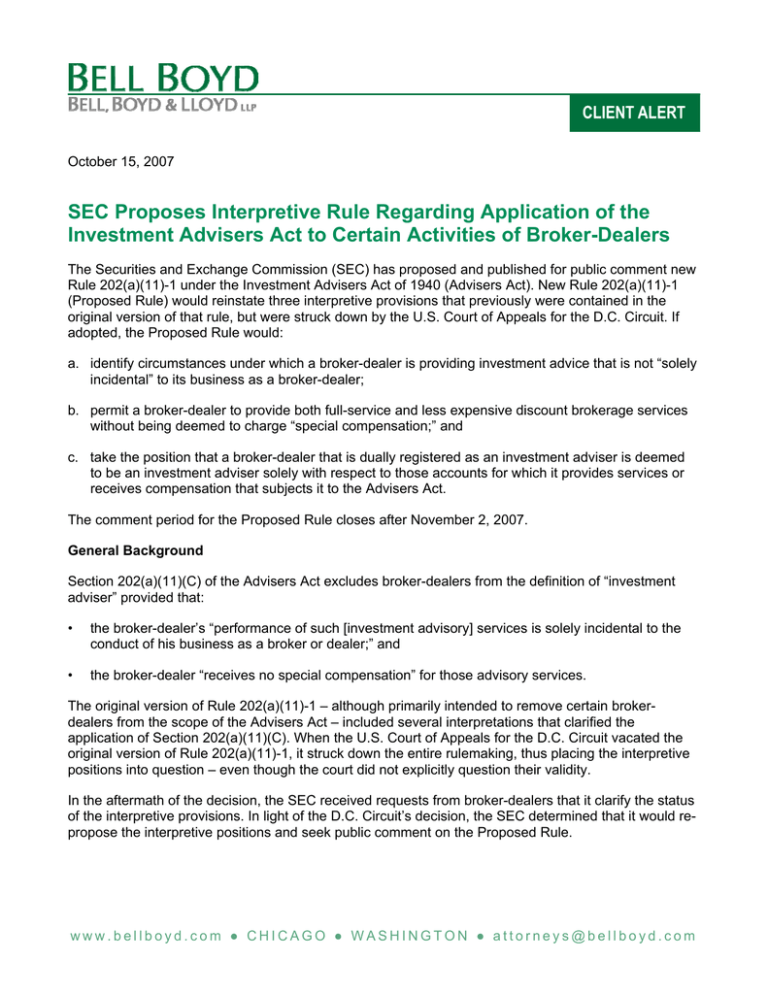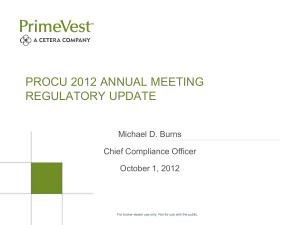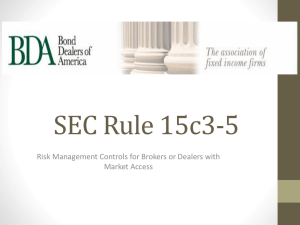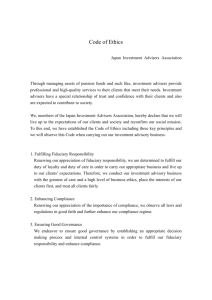
October 15, 2007
SEC Proposes Interpretive Rule Regarding Application of the
Investment Advisers Act to Certain Activities of Broker-Dealers
The Securities and Exchange Commission (SEC) has proposed and published for public comment new
Rule 202(a)(11)-1 under the Investment Advisers Act of 1940 (Advisers Act). New Rule 202(a)(11)-1
(Proposed Rule) would reinstate three interpretive provisions that previously were contained in the
original version of that rule, but were struck down by the U.S. Court of Appeals for the D.C. Circuit. If
adopted, the Proposed Rule would:
a. identify circumstances under which a broker-dealer is providing investment advice that is not “solely
incidental” to its business as a broker-dealer;
b. permit a broker-dealer to provide both full-service and less expensive discount brokerage services
without being deemed to charge “special compensation;” and
c. take the position that a broker-dealer that is dually registered as an investment adviser is deemed
to be an investment adviser solely with respect to those accounts for which it provides services or
receives compensation that subjects it to the Advisers Act.
The comment period for the Proposed Rule closes after November 2, 2007.
General Background
Section 202(a)(11)(C) of the Advisers Act excludes broker-dealers from the definition of “investment
adviser” provided that:
•
the broker-dealer’s “performance of such [investment advisory] services is solely incidental to the
conduct of his business as a broker or dealer;” and
•
the broker-dealer “receives no special compensation” for those advisory services.
The original version of Rule 202(a)(11)-1 – although primarily intended to remove certain brokerdealers from the scope of the Advisers Act – included several interpretations that clarified the
application of Section 202(a)(11)(C). When the U.S. Court of Appeals for the D.C. Circuit vacated the
original version of Rule 202(a)(11)-1, it struck down the entire rulemaking, thus placing the interpretive
positions into question – even though the court did not explicitly question their validity.
In the aftermath of the decision, the SEC received requests from broker-dealers that it clarify the status
of the interpretive provisions. In light of the D.C. Circuit’s decision, the SEC determined that it would repropose the interpretive positions and seek public comment on the Proposed Rule.
www.bellboyd.com ● CHICAGO ● WASHINGTON ● attorneys@bellboyd.com
Overview of Proposed Rule 202(a)(11)-1
The Proposed Rule would codify three interpretive positions:
1.
Proposed Rule 202(a)(11)-1(a): “Solely Incidental”
Rule 202(a)(11)-1(a) would define “solely incidental” in the negative by stating what is not solely
incidental to the conduct of a broker-dealer’s business. A broker-dealer’s investment advice is
not solely incidental to the conduct of its business as a broker-dealer if the broker-dealer:
•
charges a separate fee, or separately contracts, for advisory services; or
•
exercises investment discretion over the account, as defined in Section 3(a)(35) under the
Securities Exchange Act of 1934,∗ except investment discretion that is granted by a
customer on a temporary or limited basis.
The SEC stated its understanding that “investment advice is ‘solely incidental to’ the conduct of
a broker-dealer’s business within the meaning of section 202(a)(11)(C) when the advisory
services rendered to an account are in connection with and reasonably related to the brokerage
services provided to that account.” A separate contract providing for investment advisory
services “reflect[s] a recognition that the advisory services are provided independent of
brokerage services, and therefore, cannot be considered solely incidental to the brokerage
services.” Similarly, “when a broker-dealer charges its customers a separate fee for investment
advice, it is clearly providing advisory services….” Furthermore, the SEC stated that the
exercise of investment discretion – the ability to trade without first consulting a customer “is
qualitatively distinct from simply providing investment advice as part of a package of brokerage
services.”
The SEC noted that the scope of proposed Rule 202(a)(11)-1(a) is not intended to be exclusive;
there could be other ways in which a broker-dealer provides investment advice that is not “solely
incidental.”
Proposed Rule 202(a)(11)-1(a) has a narrower scope compared to the original rule. The original
version of Rule 202(a)(11)-1 provided that a broker-dealer was not providing incidental services
if it: (a) held itself out as a financial planner or as providing financial planning services; (b)
delivered a financial plan to its clients; or (c) represented to a customer that advice was
provided as part of financial plan or in connection with financial planning services. In contrast,
the Proposed Rule does not re-propose those interpretive positions. Instead, the SEC will
consider these issues later, after the receipt of a study by the RAND Corporation that will
compare levels of protection afforded customers of broker-dealers and clients of investment
advisers under the federal securities laws.
∗
Section 2(a)(35) states that:
A person exercises "investment discretion" with respect to an account if, directly or indirectly, such person (A) is
authorized to determine what securities or other property shall be purchased or sold by or for the account, (B) makes
decisions as to what securities or other property shall be purchased or sold by or for the account even though some other
person may have responsibility for such investment decisions, or (C) otherwise exercises such influence with respect to
the purchase and sale of securities or other property by or for the account as the Commission, by rule, determines, in the
public interest or for the protection of investors, should be subject to the operation of the provisions of this title and the
rules and regulations thereunder.
2
2.
Proposed Rule 202(a)(11)-1(b): “Special Compensation”
Rule 202(a)(11)-1(b) provides that a broker-dealer will not be deemed to receive special
compensation solely because it charges a commission, mark-up, mark-down, or similar fee for
brokerage services that is higher or lower than one it charges another customer.
This interpretive position is designed to recognize that a broker-dealer could provide some of its
customers with “full-service” brokerage, but offer others “discount” brokerage services (or
internet brokerage services) at a lower price. The Proposed Rule addresses the concern that
the additional price charged to full-service customers could be deemed to be the receipt of
special compensation by the broker-dealer in return for the provision of investment advice to
those customers. The Proposed Rule takes the position that such a price differential, standing
on its own, is not special compensation for purposes of Section 202(a)(11).
3.
Proposed Rule 202(a)(11)-1(c): Dual Registrants
Rule 202(a)(11)-1(c) states that a registered broker-dealer that also is registered as an
investment adviser under the Advisers Act is deemed to be an investment adviser solely with
respect to the accounts for which it provides services or special compensation that subject it to
the coverage of the Advisers Act.
This rule would codify a long-standing interpretation of the Advisers Act that recognizes that a
broker-dealer that also is registered as an investment adviser can distinguish between its
brokerage customers and its advisory clients. In other words, a broker-dealer that is registered
as an investment adviser would owe the fiduciary and other special obligations that arise under
the Advisers Act only to its advisory clients, and not to its broker-dealer clients.
Request for Comment
The proposing release requests comments on the Proposed Rule no later than November 2, 2007. The
full text of the proposing release is available online at http://www.sec.gov/rules/proposed/2007/ia2652.pdf. If you are interested in commenting on any aspect of the Proposed Rule, we are available to
assist you with the preparation and submission of your comment letter.
For further information, please contact Cameron Avery 312-807-4302, Kevin Bettsteller 312-807-4442,
Paul Dykstra 312-781-6029, Jennifer Esquibel 312-807-4262, Alan Goldberg 312-807-4227, Elizabeth Hudson 312-807-4376,
Anna Paglia 312-781-7163, Alicia Perla 312-807-4318, Andrew Pfau 312-807-4386, Paulita Pike 312-781-6027, Eric
Purple 202-955-7081, Bruce Rosenblum 202-955-7087, Donald Weiss 312-807-4303, Gwendolyn Williamson 202-955-7059 or
Stacy Winick 202-955-7040 of Bell, Boyd & Lloyd’s Investment Management and Financial Markets Group or visit our Web site
at www.bellboyd.com.
This publication has been prepared by the Investment Management and Financial Markets Group of Bell, Boyd & Lloyd for
clients and friends of the firm and is for information only. It is not a substitute for legal advice or individual analysis of a
particular legal matter. Readers should not act without seeking professional legal counsel. Transmission and receipt of this
publication does not create an attorney-client relationship.
© 2007 Bell, Boyd & Lloyd LLP All Rights Reserved
www.bellboyd.com
Bell, Boyd & Lloyd LLP
70 West Madison Street
Chicago, Illinois 60602
t. 312-372-1121
f. 312-827-8000
Bell, Boyd & Lloyd LLP
1615 L Street, N.W.
Washington, D.C. 20036
t. 202-466-6300
f. 202-463-0678






